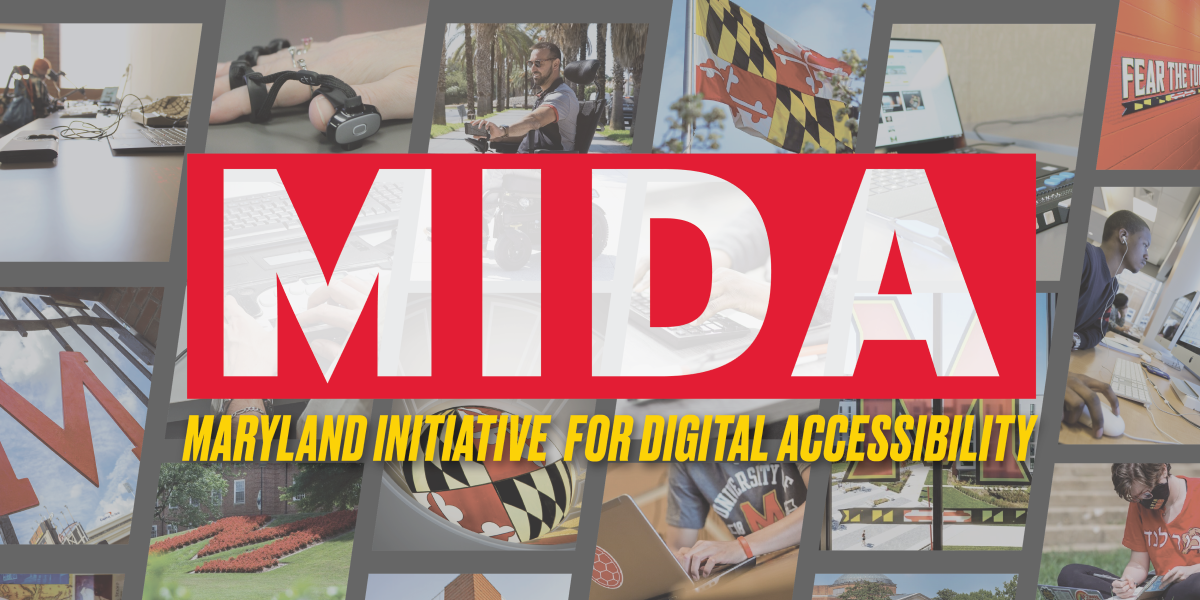UMD Maryland Initiative for Digital Accessibility (MIDA) partners with Adobe and the U.S. Access Board; informs state and federal policy

Disability rights advocates often call for digital technologies and content to be built using a born-accessible approach. The born-accessible approach involves building accessibility into digital technologies and content from the beginning, meaning that only technologies that are accessible are released to users. This should lead to lower costs and eliminate the delay in access when people with disabilities are waiting for inaccessible technologies to be remediated for accessibility. While the publishing industry has methods in place for born-accessible books, the human-computer interaction research and user experience practitioner communities have not yet fully defined methods and tools for born-accessible design approaches. One of the major goals of the University of Maryland (UMD) Maryland Initiative for Digital Accessibility (MIDA), a campus-wide initiative funded by the UMD grand challenges program, is to encourage the use of born-accessible concepts, to more fully define methods and tools for born-accessible design and increase research into born-accessible design.
MIDA faculty and students are currently involved in two major research and development projects attempting to develop methods and tools for the born-accessible approach and to apply born-accessible concepts, with Adobe and the U.S. Access Board, respectively. MIDA director Jonathan Lazar (College of Information, UMD), MIDA associate director J Bern Jordan (College of Information, UMD), MIDA affiliate faculty member Jinjuan Heidi Feng (Department of Computer & Information Sciences, Towson University), and PhD candidate Rachel Wood (College of Information, UMD) are involved with the Access Board project. Lazar and PhD student Abhinav Kannan (College of Information, UMD) are involved with the Adobe project.
In fall 2023, MIDA organized a series of six “listening sessions” for the Adobe and U.S. Access Board projects, which were attended by the leadership of national disability rights groups as well as Maryland state leaders. Listening sessions are a method for involving people with disabilities from the beginning of projects. For the Adobe project, this led to a series of sketches and prototypes for Adobe Express which will be evaluated in usability testing this fall. For the U.S. Access Board, this led to 24 interviews with government officials (the content of those is now being analyzed) to help develop a new hybrid approach for accessibility testing which involves a combination of manual (human) and automated testing.
To help spread awareness of born-accessible concepts, Lazar has already given ten external presentations about the born-accessible approach during the 2023-2024 academic year and expects to give another six presentations this fall. Two major events about born-accessible design are coming up during this academic year: MIDA has been collaborating with the Welsh government and Cardiff University, and a day-long conference on born-accessible design will be held at Cardiff University on November 6, 2024 with Lazar as the keynote speaker presenting about UMD’s work on born-accessible design. And the Radcliffe Institute for Advanced Study at Harvard University will be holding a two-day workshop in May 2025, “Born-Accessible Design for Digital Accessibility: Defining, Scoping Methods, and Setting a Research Agenda,” to bring together stakeholders such as disability rights communities, tech companies, policymakers, and researchers to help define methods for born-accessible design.
In addition to defining methods and tools, MIDA has also been successful in informing State and Federal policies and laws to include born-accessible concepts. There are three recent examples of born-accessible concepts being integrated into policies and laws: 1) The Section 508 Refresh Act of 2024 bill recently introduced in the U.S. Senate, 2) A December 2023 memo from OMB setting out policies for Section 508 going forward, and 3) the new Maryland government policy on digital accessibility.
The entire MIDA community looks forward to moving the world of technology more towards born-accessible design approaches.